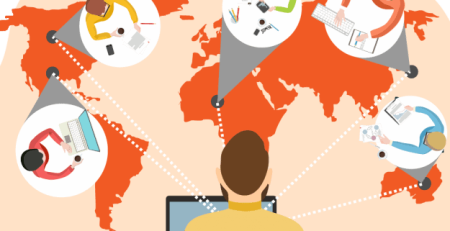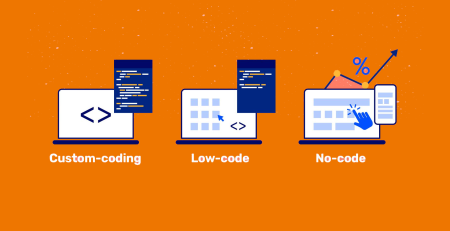Software Outsourcing Industry in Egypt
Egypt has long been stereotyped as a Bedouin country where people live in tents and ride camels over the desert that surrounds the Great Pyramids. A portrayal that, to the uninitiated, has been reinforced over the years by films such as Transformers, which paint a naive and amateurish view of a country that has long been known for its incredible architectural legacy.
True, the majority of Egypt is desert 90%, yet Egyptians live in the 10% that isn’t desert, along the Nile’s banks and in coastal cities (Mediterranean and Red Sea coasts). For thousands of years, Egypt has been reliant on agriculture and trade.
Egypt realized 40 years ago that it needed to shift outside the Nile valley to accommodate its rising population. The dream was to “decentralize” Cairo by building new cities and utilizing the vast desert that remained undeveloped. East and west of Cairo, new cities were established. A new industrial city was founded south-west of Alexandria at the same time. Construction of new towns and business hubs has never slowed since then.
Egypt’s recent income has been derived from agricultural and industrial sources. However, there has been a considerable variance in how tourism, transportation (Suez Canal), financial services, and ICT are used to produce revenue.
Egypt has taken consistent measures to promote itself as a service provider partner for the US and EMEA markets, despite its determination to grow its IT industry and economy.
Smart Village, Egypt’s first and central technology business sector, is located on the outskirts of Cairo, some 22 kilometers from the Great Pyramids of Giza. The Smart Village is located in the 6th of October city, which was established in 1979 by visionary Egyptian president Anwar El Sadat, whom Chancellor Helmut Schmidt described as a “political hero” and “close friend.”
Egypt has a distinct set of characteristics that distinguish it apart from other markets. Qualities such as proximity to European markets as well as similar time zones, low labour costs, and an endless supply of talent.
Egypt was named outsourcing destination of the year by the Global Sourcing Association (GSA) in 2016. Egypt’s export volume has surpassed $3.6 billion, with 174,000 jobs being offshored. This demonstrates how successfully Egypt’s ICT market has grown. The company’s services portfolio is evolving away from multilingual contact centre services and toward higher-value activities like product creation and research and development.
Today, worldwide corporations such as Microsoft, Cisco, IBM, HP, Dell, Oracle, Vodafone, and Orange have local headquarters in Smart Village. Some companies, such as SAP, EMC, and the Microsoft Center of Expertise, have chosen to operate from Cairo’s eastern outskirts, where more business hubs have been built or are being built.
Let’s take a closer look at how Egypt’s advantages help the outsourcing sector.
Government Support
Egypt’s advancing standing and dominance in this field can be attributed to growing government assistance. For the past 20 years, technical education has been a focus, resulting in thousands of graduates in subjects such as engineering and computer and information sciences.
Physical Infrastructure Improvements
Any high-quality IT outsourcing sector relies on strong telecommunications connectivity. Egypt, well aware of this, has made significant investments in its utilities and internet connectivity.
Internet access has improved significantly as a result of its location in the midst of the global cable network and the deployment of high-quality underwater cables. One that has allowed Egypt to supply offshore cloud services to EMEA regions with the lowest latencies, establishing Egypt as a “Digital Canal.”
Multiple Technology Parks
Egypt has started constructing large-scale technological parks across the country. This has prompted several global corporations to set up shop in the country. A new administrative capital east of Cairo is also fast expanding. The capital is being planned as a Smart City project, with all facilities controlled by technology. AI, IoT, and big data analytics investments are intended to expand the talent pool and local resources in these fields.
The new administrative capital will include a Knowledge City, which would house foreign institutions, as well as innovation and entrepreneurial centers and a science park.
Large Talent Pool
Egypt is Africa’s third-largest country, with a fast rising young population. Egypt’s yearly graduate turnover is over 500,000, with 330,000 having the capabilities needed to deliver business process services. Egypt has more than 50 universities and 100 institutions. 50,000 young men and women with IT talents are introduced to the IT industry each year.
Major technology companies in Egypt, such as IBM, have cooperated with government technology programmes and educational institutions over the years. This type of collaboration has helped to fund and sustain research initiatives, as well as provide internships and training opportunities for undergraduate and graduate students.
More money is being invested into supporting and accelerating the development of skills in emerging technologies. This covers technology such as data science, artificial intelligence, the Internet of Things, and cybersecurity.
Furthermore, companies such as Cisco and Microsoft are collaborating with educational institutions to provide real-world training and internships to technology students. Mobile development, big data, and the Internet of Things are the main areas of concentration. Before 2022, Egypt wants to train and certify 45,000 resources.
Language Skills
Despite the fact that Arabic is the country’s official language, Egypt employs a considerable number of people who are fluent in English (90,000 annual graduates), French (5,400 yearly graduates), German (3,000 annual graduates), and other European languages. This bilingual and diverse skill pool is a tempting possibility, particularly for markets with a shortage of human resources.
Egypt is a very appealing market in this regard. This is why Vodafone has chosen Egypt as the location for its global technological center of excellence.
“Things such as RPA (Robotic Process Automation) is being done out of Egypt for the rest of the world. So many activities where you can see that it’s really the technical hub is happening in Egypt. Why is that? Simply because we have fantastic talent in the market and we have the ability from a cost perspective to offer quality services in a very competitive price to our other operators around the world.” Alexandre Froment-Curtil, CEO, Vodafone Egypt.
Competitive Labour Costs
Egypt provides a relatively low operating cost per person hired. When compared to the annual operational cost per FTE in European markets, including Eastern Europe, recruiting Egyptian talent saves over 60%. With an average cost of hiring a junior software developer of €6,400 per year, hiring Egyptian talent saves over 60%.
Egypt BP & IT outsourcing market
Egypt embarked on its IT services journey at the turn of the century. In less than 20 years, it has become one of the fastest-growing destinations in the world.
In 2009, its information technology exports averaged $800m. In 2017, it reached $3.2 billion and is estimated to grow to $4.7 billion in 2020.
BPO is quickly growing around the world as companies strive to respond to market conditions while streamlining their processes. The BPO industry is expected to grow quickly globally through 2020. (IDC).
The rise of Egypt’s ICT industry has been aided by a variety of external causes. Due to a considerable shortage of trained labour, Europe’s growing demand for IT and business process capabilities is unmet. Furthermore, the shared service industry’s transition toward higher-value services, combined with rising costs in nearshore destinations in Central and Eastern European countries, have functioned as stimulants for Egypt’s ICT and BSS industry’s expansion.
IDC forecasts R&D/product engineering, which falls under KPO, to reach $65.6 million in 2020 as Egypt focuses more on boosting its KPO services exports.
BPO categories are also continuously rising, with the customer care industry growing at a 16.2 percent annual rate. Other categories, such as human resources, finance, and procurement, are predicted to rise at a similar rate of 10.3 percent through 2020.
Egypt also finds customers for its BPO exports in the Middle East and North Africa. Large and medium business users of Egyptian BPO services can be found in Turkey, Saudi Arabia, the United Arab Emirates, South Africa, Nigeria, and Kenya.
Dell Technologies Egypt Centre of Excellence
Egypt is home to one of Dell’s four global Technology Centers. The other three are in Ireland, China, and India, respectively. The Egypt Centre of Excellence (COE) provides Dell Technologies and its clients around the world with essential advanced solutions and support services.
“Egypt was and continues to be an optimum choice to host our COE, where we can find the value in the abundant & multi-lingual talent supply, competitive cost, government support, agility, innovation, continuous process enhancements, as well as the quality and scalable infrastructure.” Magued Mahmoud is Vice President and General Manager, Egypt Centre of Excellence (COE) at Dell Technologies, on why Egypt hosts COE.
The COE in Egypt was founded in 2009 with only 83 people. It now employs approximately 1,400 employees and team members, with over half of them (47%) being female.
UN Africa Technology Innovation Lab
Egypt’s achievements in the fields of information technology and business were a deciding factor in the United Nations’ decision to locate its UNTIL headquarters in Africa. The UN established the “African Regional United Nations Technology Innovation Lab” in 2017.
This is part of the United Nations’ goal to create a global network of technological innovation laboratories.
“We have watched the creation of smart towns and technological parks beyond Cairo, accessing hitherto untouched territory and unravelled youth potential,” said Richard Dictus, UNDP Resident Representative in Egypt. These new businesses will serve as critical infrastructure, generating entrepreneurs and facilitating the emergence of a slew of technology-based businesses and enormous knowledge transfer. We’ve seen the dedication to IT and ICT-driven innovation and entrepreneurship through robust young capacity development programmes… that aim to maintain Egypt’s strategic position as a technology leader both locally and internationally.”
In Egypt’s Smart Village, the UNTIL headquarters are housed in the Technology Innovation and Entrepreneurship Centre (TIEC). The Cairo lab will collaborate with and have access to a network of UN technology innovation laboratories, with the purpose of employing creative technology solutions to meet Egypt’s sustainable development agenda.
Egypt has become a major hub for business activities in EMEA as a result of its great geographical location and winning value proposition.













Leave a Reply